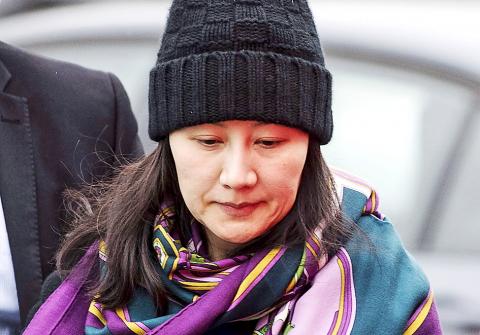A Chinese government spokesman yesterday took issue with US claims that telecoms giant Huawei Technologies Co (華為) poses a threat to other countries’ information security because of Chinese laws.
The comments by China’s National People’s Congress spokesman Zhang Yesui (張業遂), ahead of the annual session of China’s rubber-stamp parliament, followed news that Huawei chief financial officer Meng Wanzhou (孟晚舟), who was arrested by Canada at the request of the US, is suing the Canadian government over her treatment.
Lawyers for Meng, who is staying at a property she owns in Vancouver after her release on bail, on Sunday said that she was suing the Canadian government, its border agency and the national police force, alleging she was detained, searched and interrogated before she was told that she was under arrest.

Photo: AP
The US is seeking Meng’s extradition to face charges she misled banks about the company’s business with Iran.
Washington has been lobbying its allies to shun Huawei’s products on national security grounds, saying Chinese law requires the company to provide it with intelligence on its foreign clients whenever requested.
Zhang said that US officials were taking China’s national security law out of context and “playing up the so-called security risks” associated with Chinese companies.
The 2017 law borrows from other countries’ experiences and is designed explicitly to “protect human rights and the lawful rights of individuals and organizations,” Zhang said.
“This kind of behavior is interference into economic activities by political means and is against World Trade Organization rules. It disrupts an international market order that is built on fair competition,” Zhang told reporters.
“This is a typical case of double standards that is neither fair nor ethical,” he added.
Washington’s accusations have been underscored by Meng’s arrest on Dec. 1.
Huawei also faces other allegations in the US related to alleged theft of technology.
Meng is due in court tomorrow to set a date for the extradition proceedings to start. It could be several months or even years before her case is resolved.
Chinese Ministry of Foreign Affairs spokesman Lu Kang (陸慷) yesterday also accused Canada and the US of abusing their bilateral extradition treaty.
He reiterated China’s demand that the US withdraw its accusations against Meng.
China urges Canada to “immediately release Ms Meng Wanzhou and let her return to China in safety while ensuring her legitimate and justifiable rights and interests and not repeat [Canada’s] mistakes,” Lu said at a daily news briefing.
In related news, state media reported that China suspects detained former Canadian diplomat Michael Kovrig of spying and stealing state secrets.
Another Canadian in detention — businessman Michael Spavor — was one of Kovrig’s main sources of intelligence, Xinhua news agency said, citing Chinese authorities.
The pair were detained in December just days after Canada arrested Meng.
Chinese authorities had previously said that the two men were under investigation on suspicion of endangering national security.

MORE VISITORS: The Tourism Administration said that it is seeing positive prospects in its efforts to expand the tourism market in North America and Europe Taiwan has been ranked as the cheapest place in the world to travel to this year, based on a list recommended by NerdWallet. The San Francisco-based personal finance company said that Taiwan topped the list of 16 nations it chose for budget travelers because US tourists do not need visas and travelers can easily have a good meal for less than US$10. A bus ride in Taipei costs just under US$0.50, while subway rides start at US$0.60, the firm said, adding that public transportation in Taiwan is easy to navigate. The firm also called Taiwan a “food lover’s paradise,” citing inexpensive breakfast stalls

TRADE: A mandatory declaration of origin for manufactured goods bound for the US is to take effect on May 7 to block China from exploiting Taiwan’s trade channels All products manufactured in Taiwan and exported to the US must include a signed declaration of origin starting on May 7, the Bureau of Foreign Trade announced yesterday. US President Donald Trump on April 2 imposed a 32 percent tariff on imports from Taiwan, but one week later announced a 90-day pause on its implementation. However, a universal 10 percent tariff was immediately applied to most imports from around the world. On April 12, the Trump administration further exempted computers, smartphones and semiconductors from the new tariffs. In response, President William Lai’s (賴清德) administration has introduced a series of countermeasures to support affected

CROSS-STRAIT: The vast majority of Taiwanese support maintaining the ‘status quo,’ while concern is rising about Beijing’s influence operations More than eight out of 10 Taiwanese reject Beijing’s “one country, two systems” framework for cross-strait relations, according to a survey released by the Mainland Affairs Council (MAC) on Thursday. The MAC’s latest quarterly survey found that 84.4 percent of respondents opposed Beijing’s “one country, two systems” formula for handling cross-strait relations — a figure consistent with past polling. Over the past three years, opposition to the framework has remained high, ranging from a low of 83.6 percent in April 2023 to a peak of 89.6 percent in April last year. In the most recent poll, 82.5 percent also rejected China’s

PLUGGING HOLES: The amendments would bring the legislation in line with systems found in other countries such as Japan and the US, Legislator Chen Kuan-ting said Democratic Progressive Party (DPP) Legislator Chen Kuan-ting (陳冠廷) has proposed amending national security legislation amid a spate of espionage cases. Potential gaps in security vetting procedures for personnel with access to sensitive information prompted him to propose the amendments, which would introduce changes to Article 14 of the Classified National Security Information Protection Act (國家機密保護法), Chen said yesterday. The proposal, which aims to enhance interagency vetting procedures and reduce the risk of classified information leaks, would establish a comprehensive security clearance system in Taiwan, he said. The amendment would require character and loyalty checks for civil servants and intelligence personnel prior to